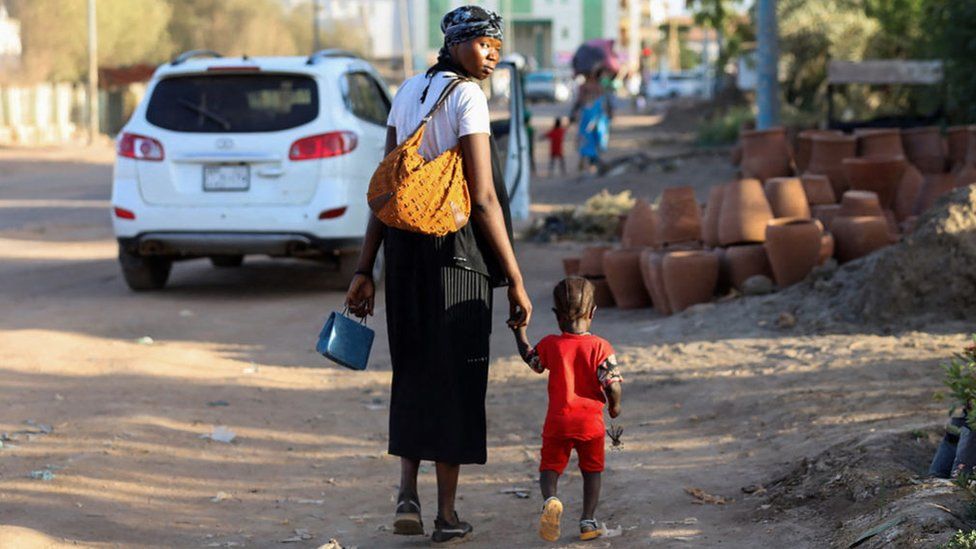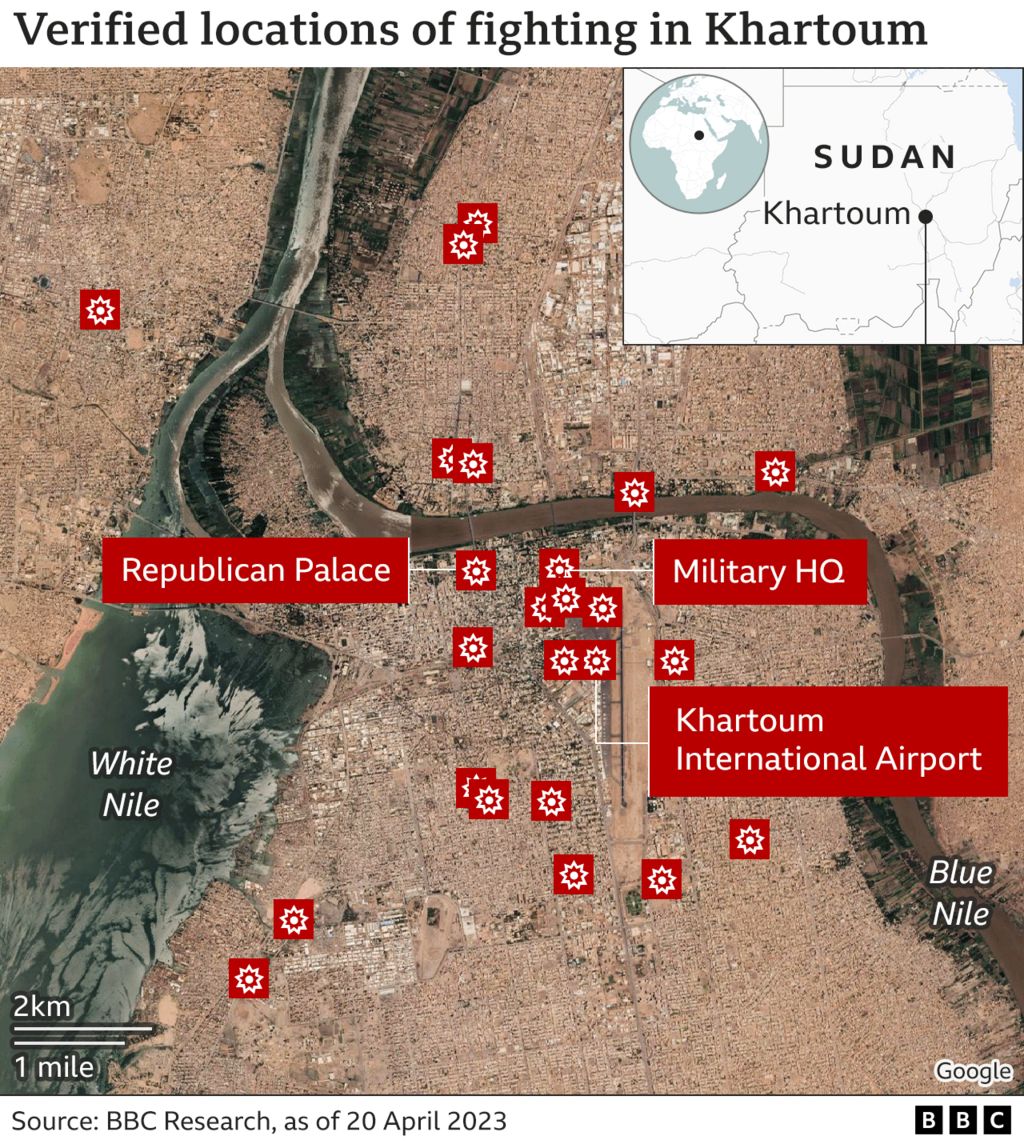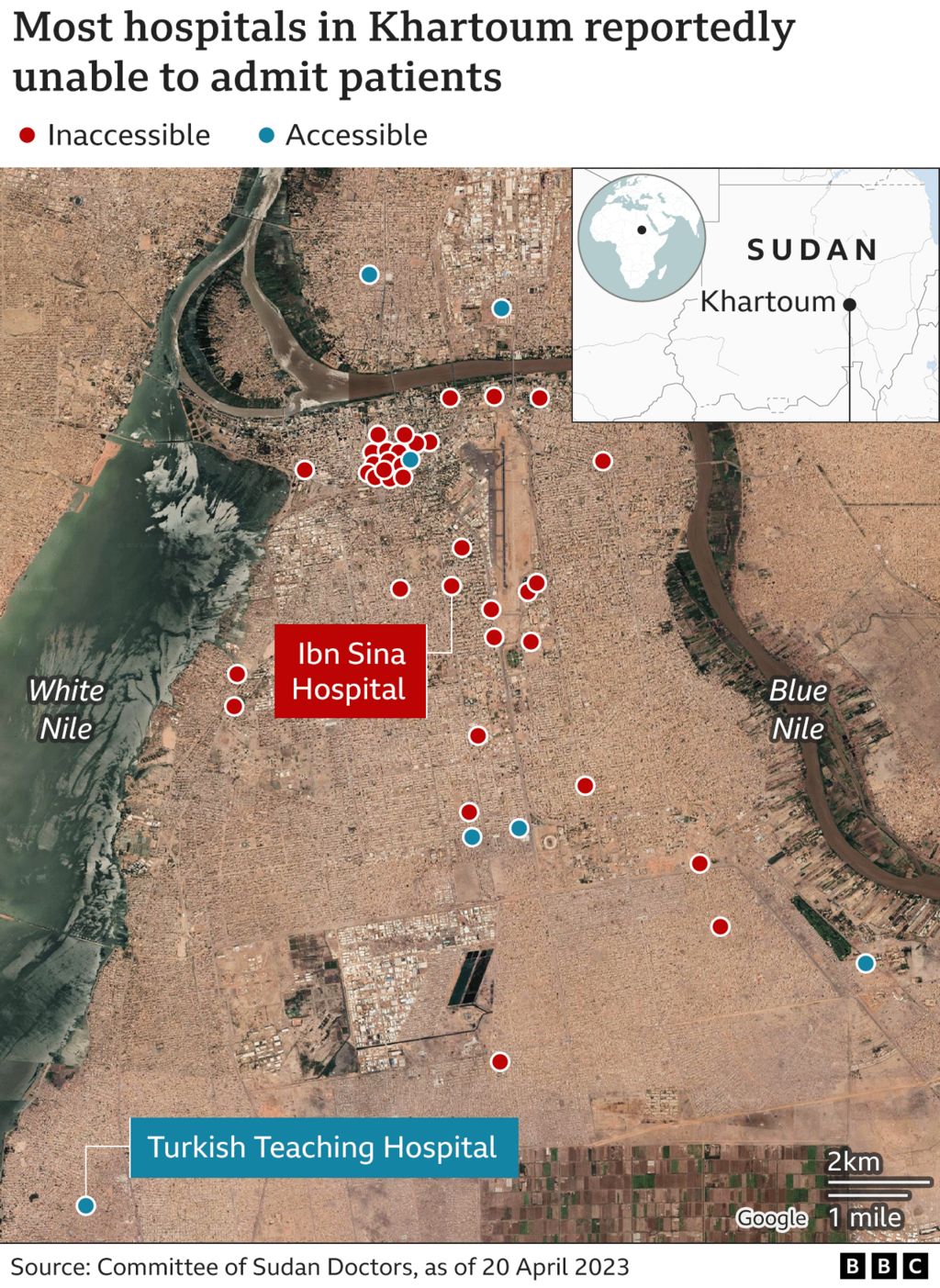
Life in Sudan's capital Khartoum has been turned on its head.
Once a bustling metropolis, residents are now living in a war zone. Sudan's army and the paramilitary Rapid Support Forces (RSF) are locked in brutal street combat as helicopters and fighter jets roar overhead.
Information coming out of the city is patchy, and access for journalists is difficult in a country where media freedom is already restricted.
But the BBC has combed through dozens of videos, mapped the fighting, and spoken to some of the city's 5.4 million residents to uncover how air strikes and artillery have devastated the heart of Khartoum.
One of them, Dallia Mohamed Abdelmoniem, said the "empty frightened streets" made Khartoum feel like a ghost town, with people "huddled in their houses not knowing what's going to happen next".
Fighting traps civilians in their homes
The BBC has verified videos from Sudan by checking details such as local weather patterns and the positions of visible landmarks including roads, roofs and rivers.
We have been able to locate some of the heaviest fighting, including gun battles and the use of tanks, to heavily populated areas.
Civilians have been badly affected because many targets such as military headquarters and the presidential palace are close to people's homes.

As you can see from the satellite image above, almost all of central Khartoum - south of the Blue Nile - is densely populated. So is Khartoum North, where fighting is also taking place.
Monzir Bashir, a journalist based in Khartoum North, told the BBC he could hear explosions "from all directions" and that he had seen at least four people shot "near the well we bring water from" on Wednesday.
Heba, a Khartoum resident, said that brief lulls between the explosions and gunfire seemed to last an eternity.
"We now fear the silence more than the sounds of the clashes," she said. "Because after the pause, there are even louder bangs."
Below are three verified videos from the city in the past few days.
In the first, a video from Khartoum's Al-Sahafa neighbourhood on Friday shows a black smoke cloud rising over the airport there. The video shows how close residents are to the fighting: Khartoum's international airport is right in the middle of the city, near to several residential areas, hospitals and schools.
This video can not be played
To play this video you need to enable JavaScript in your browser.
In the second, an explosion is filmed in the early hours of Friday on Al Siteen Street, in central Khartoum - the area has shops, restaurants, a mosque, a school and a playground.
This video can not be played
To play this video you need to enable JavaScript in your browser.
In the third, soldiers from the armed forces can be seen marching down Al-Ma Una street in Khartoum North towards central Khartoum on Friday. There are no vehicles in the street and the only other people are groups of residents, who appear to be cheering the soldiers.
This video can not be played
To play this video you need to enable JavaScript in your browser.
As the Muslim festival of Eid al-Fitr dawned in Sudan on Friday morning, marking the end of Ramadan for Muslims in the country, residents told the BBC that fighting had continued, with consistent volleys of gunfire exchanged between 01:00 and 03:00 local time (00:00 and 02:00 BST).
Mahsin Dohab, who lives in eastern Khartoum, told the BBC that an RSF-proposed 72-hour truce to mark the holiday had failed to materialise.
"People cannot go to prayers due to heavy artillery and gunfire... We're heartbroken, all of us," she told the Newsday programme.
Food and water run low
Heba told the BBC that "people who dare to go out just run around to get their basic needs in a rush", and that there was a shortage of groceries and medicines. Goods that remain in stock are three times their normal price.
Explosions have hit key infrastructure and civilians have been left without running water and electricity.
Many people in Khartoum - including the large number fasting during Ramadan - have been forced to brave the fighting to collect water from the White Nile River.
Ms Dohab said her family had been trying to survive without water for the past seven days. "We're basically relying on the kindness of strangers," she said.
Shahd Amjed, who lives in the affluent Kafouri block in Khartoum North, said the government's claims to be in control of the capital did not match the reality on the ground.
The military say they are in control of everything, but in the street all you see is RSF. There is fear and confusion. Everyone is getting depressed. We really don't know what is.
She added that earlier in the week three RSF fighters had broken into her house yard at 02:00 local time. "They didn't harass us but they changed their clothes and left. We found their uniform trousers in the morning."
Hospitals and doctors on their knees
Meanwhile, the situation at the city's hospitals is dire. Doctors told the BBC that the health system was on the brink of complete failure - just as it tries to deal with the more than 3,500 people injured since fighting began, according to World Health Organization figures.
Administrators say hospitals have been hit by air strikes and doctors have warned that fighting between the army and paramilitary troops has stopped them from getting to work.
On Thursday, Médecins Sans Frontières told the BBC that of the city's three major hospitals, Bahari Technical Hospital had closed after shelling and the other two - Umdurman Technical Hospital and Khartoum Technical Hospital - were "barely functional" as doctors couldn't reach them.
According to the Sudanese Doctors Union (SDU), just 23 of the 78 hospitals and medical centres in and around Khartoum remain operational. At least five ambulance crews have been attacked during their duties, it added.
Using a list provided by the SDU, the BBC has mapped the hospitals in the city centre that have been forced to close - as well as some that remain open.

Dr Alaaeldin Nogoud, a doctor based at the Ibn Sina Hospital, shown on the map above, told the BBC that the chaos across the city had caused "a total collapse of the health system in Khartoum".
"At the hospital where I was working there was a bombing from an aircraft the day before yesterday, which meant all the patients had to be evacuated," he said.
"It's completely impacted my ability to provide care. I haven't been able to reach a hospital for the past two days because of the fighting."
Another medic - named Dr Asmaa - is based at the Turkish Teaching Hospital in southern Khartoum, shown on the map. Her hospital was suffering from shortages of everything from power to blood supplies after two emergency caesarean sections consumed reserves, she said.
Doctors were also dealing with harrowing stories from patients.
"I've been receiving many calls and WhatsApp messages from day one of the fighting.
"One call was a pregnant woman who had contractions, and I guess she was pregnant in the second trimester. I don't know how many weeks she was, but due to fear she started bleeding," Dr Asmaa said. The woman eventually lost the baby.
People fleeing met with violence
As the fighting has intensified, many have tried to escape the city - but routes out remain limited and fraught with risk.
Dallia Mohammed Abdelmoniem told the BBC her family "were meant to leave [on Wednesday], but there was intense fighting and we found our cars had been vandalised" which left them trapped in the capital.
On Thursday, BBC reporters observed thousands of people gathering at two bus stations in the capital.
At Al-Souq Al-Sha'by bus station in Omdurman - which adjoins Khartoum to the north-west - civilians were searching for transport to northern Sudan.
Others were meeting at the Mina Al-Berri station in central Khartoum, where they hoped to reach southern and central Sudan.
Some civilians at the stations managed to board the few buses still operating routes out of the city, while others clambered onto flatbed trucks for the journey ahead.
Travelling out is itself dangerous. On Wednesday, one resident told the BBC that the RSF had set up roadblocks around the capital and that paramilitary fighters had stolen his phone and a small amount of cash.
One southern Khartoum resident, Zeirra, told the BBC that her relatives in the central Gezira state sent a bus to collect her. She said she was stopped by RSF militants along the road who checked her documents, but she was allowed to pass. Shortly after, the checkpoint came under attack.
[The RSF] got attacked by military through air strikes... We were able to hear it on the way. Unfortunate travellers behind were hold hostages by RSF as human barriers.
And Mahsin Dahab told the BBC that one of her colleagues had been shot dead alongside her family by militants as they tried to flee Khartoum from an area near the centre of the city.
For those that escape the capital, an uncertain future lies ahead, with no end to the conflict in sight.
Speaking to the BBC from her relatives' home in Gezira, Zeirra reflected on the chaos of the past week.
"Never in my life I had thought I'll be leaving home forcibly and [become] an internally displaced person," she said.
"But it is what it is I guess. We are left with nothing but prayers."
Additional reporting by Chloe Kim, Oliver Slow, Jake Horton, Emma Pengelly, James Kelly and Hanan Razek.
Visual journalism by Erwan Rivault.
Editing by Samuel Horti.
The BBC is continuing to investigate video out of Khartoum.
BBC Arabic's Mohamed Osman in Khartoum contributed to his article, and has written about his experiences in the piece below:
Related Topics
https://news.google.com/rss/articles/CBMiMGh0dHBzOi8vd3d3LmJiYy5jby51ay9uZXdzL3dvcmxkLWFmcmljYS02NTMzODE4MdIBNGh0dHBzOi8vd3d3LmJiYy5jby51ay9uZXdzL3dvcmxkLWFmcmljYS02NTMzODE4MS5hbXA?oc=5
2023-04-22 08:07:09Z
1964736948
Tidak ada komentar:
Posting Komentar